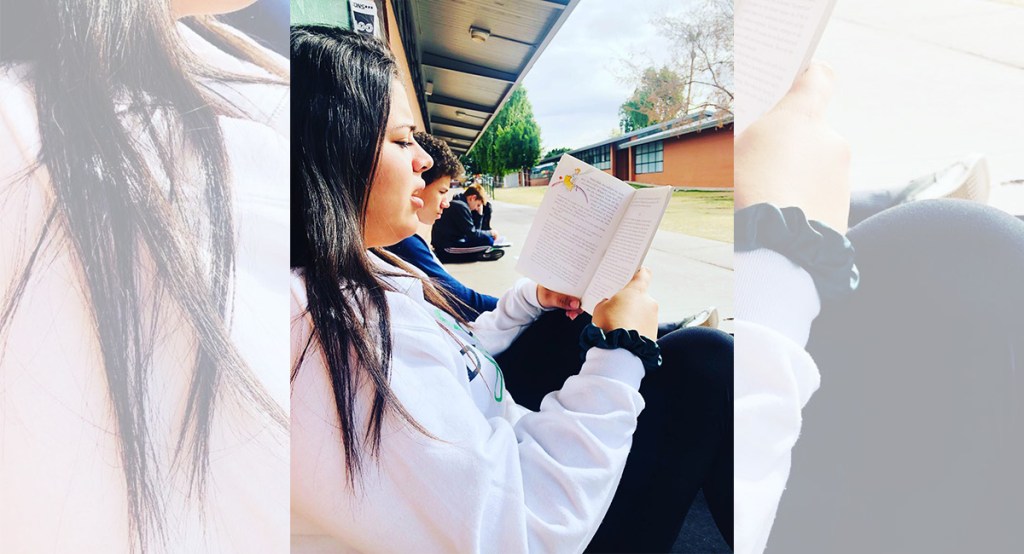April McNary, a teacher at Sunnyslope High School in Phoenix, Arizona, has always believed in the transformative power of reading and writing. The honest conversations that are sparked by this creative work, she says, are some of the most valuable to her.
“Allowing students to wrestle with their thoughts and convictions is something that happens on a regular basis, and it’s one of the parts I love most about my career choice,” says McNary.
While learning from great written works like Shakespeare is always on the agenda, McNary also makes a point of giving her students space to write and reflect on pressing issues that affect them directly — like gun violence. After the Parkland shooting happened, she gave her students time to do just that, then discuss what they wrote in small groups. Allowing the students space to express their feelings helped everyone feel better and get on with the day.
One area of creative expression McNary felt like she needed to boost in her classroom was poetry.
“Knowing that reading one’s own poetry is terrifying for some (and something I still won’t assign), I figured something less daunting was to read a poem someone else had written/published,” she explains.
But she implemented a twist — students had to choose a poem with which they had some sort of personal connection. Little did she know what incredible moments were about to transpire as a result.

One girl came out in front of the class. A boy, who was known as a jock, wept while telling everyone his mother was dying of cancer. Another girl spoke about how her parents had been deported and she had to take up a job to help support herself and her siblings. And another girl couldn’t even finish her poem about being bullied, it affected her so much.
The common thread through all of these incredibly emotional admissions was empathy; the class rallied around each person going through it, applauding, hugging, and weeping right along with them. The act of expressing oneself through another’s words seemed to be the permission they needed to open the floodgates and truly support one another.
One reading in particular, however, hit McNary at her core. A student in her class named Chris* brought in a poem from the novel, “The Perks of Being a Wallflower,” that clearly denotes suicidal ideation. But it wasn’t just the context of the poem that concerned her, “it was the way he read it. It’s hard to explain to anyone who wasn’t in the room, but it was as if he was reading like the original writer of such dark thoughts.”
She’d also noticed how he seemed more and more distant in class and in his weekly journal writing. He wouldn’t make eye contact with anyone. So, after the class where he presented the poem, McNary reached out to Chris’ mom and expressed her concerns. Sadly, she was immediately receptive because she’d noticed her son’s behavior, too. They made a plan to keep a close eye on him, and check in with the school social worker.
Chris came in the next day and told McNary his mom had spoken to him about their concerns. “I asked him if he was mad at me, and he said no (with tears in his eyes). I think, although he didn’t say it, he was relieved,” she says. He started coming in to talk with her before school about books and other things. One day, later in the year, he told her he’d joined a band. After that he started talking to her and his mom about his dreams and goals. “I think Chris needed to be seen and heard,” says McNary.
Soon enough, he headed off to college, but he didn’t forget about McNary. Eventually, he wrote her an email telling her he was doing well and hoped she was too. “I remember just crying as I read the email a few times. I was beyond relieved and grateful that he had found a place in college, and was positive about his future,” she says.
She was so moved by his message that she decided to write a poem herself about him. She often writes to process emotions, just as she instructs her students.

Since the poetry-reading assignment had done so much good in her own classroom, McNary decided to submit the idea to the nonprofit, First Book, for inclusion in a toolkit they were developing to help educators promote respect and empathy in the classroom.
First Book helps qualifying teachers like McNary get affordable books and supplies for their students, as well as free professional development tools. She heard about the call for submissions for their Respect and Empathy toolkit via an email they’d sent her. She never expected her exercise would be chosen, and was shocked and humbled when she found out.
McNary hopes the exercise will inspire many more students to really see and hear each other and “accept who their peers are at their core.” The point is for students to learn that being vulnerable is a strength, not a weakness, and should be respected as such.
And she has hopes for the teachers who utilize her exercise, too. “I hope they see the value in turning the floor over to their students completely. My hope is for other teachers to sit in the back of the room in awe of their students like I do every year. I also hope that teachers know the power they have to connect kids to one another through experience and poetry.”
*The name has been changed to protect the identity of the individual.
This article is sponsored by C&S Wholesale Grocers.















